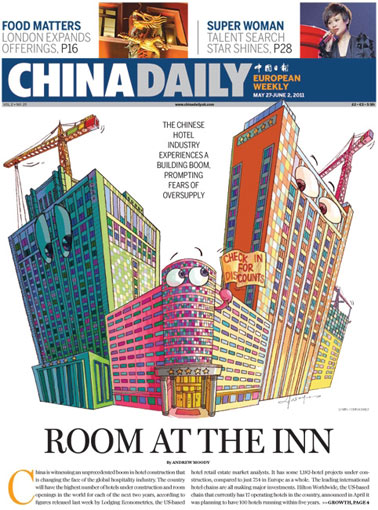View
Back to the future of the days of print media
Updated: 2011-05-26 07:58
By Mark Hughes (China Daily)

The 3-D hologram in the kitchen told me the wind was high, sending my turbine into bankable electricity assets, its 1 million peanut-oil greased ball-bearings protected from invasive Mongolian sand by organic microfilters made from banana filament genetically engineered with strands of silk.
I employed the electric bottle opener to "uncork" the wine. It tickled me that such a quaint verb had survived the destruction of most trees during the last, explosive war.
The act of removing the stopper activated my Internet connection, immediately alerting the local supacenter that bacchanalian indulgence was about to begin.
As their data ants began processing the information, my Facetome awoke.
The mouth-watering aroma of roast chicken filtered over the airwaves from Bing's smellme application 3 kilometers down the flight path. She'd set her alerts to the subtleties of fermented grape, as indeed had I.
Within a moment, her hologram was beside me.
"Put it in the transporter," the luscious but untouchable image intoned. "In fact, join it."
I didn't trust the relatively new device to get me to her apartment unscrambled but happily complied with the wine. Relatively few people had died from wine that had been de-molecularized then reformatted elsewhere. The specialist magazines had identified certain grapes as dangerous after undergoing the process.
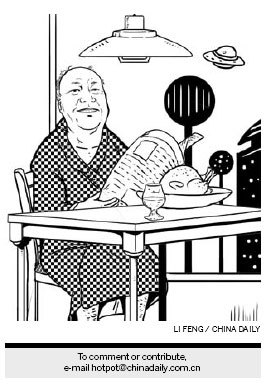
Seconds later, I had strapped on my jetpack and was on my way. Traffic was not hard to navigate. I only saw two fatal collisions along the way, caused by the sudden appearance of advertising holograms in the sky. People had not yet got used to them and screeched to a halt, cutting power to the jetpack and sending them tumbling down to Earth.
Bing lived on the 365th floor of a block due south of me. The area was a forest of immensely tall skyscrapers, all clearly labeled with their addresses.
Most of China's cities were like this now. They had to be to house a population of 3.9 billion while maintaining enough space to cultivate sufficient genetically modified crops and rear chemically enhanced animals with which to feed it.
I landed on Bing's balcony and used my sonic key to open the glass doors. She was watching a news report about the unification of Africa on a super-thin screen that occupied an entire wall. Nelson Mandela, looking as good as he did 90 years earlier, before he underwent life-extending cryosurgery, was being inaugurated as president.
On seeing me she asked the screen to shut down. It complied silently.
We greeted each other. Then she went over to the table where my wine was already poured and lifted a 24-centimeter glass dome. The aroma of roasted chicken returned, emanating from two moist white square slabs of processed meat on twin plates. We tucked in, occasionally taking a vegetable pill from a bowl and swallowing it.
Bing told me about her holiday plans. She intended to visit a theme park based on life in the early 21st century in Beijing.
"The city was so uncrowded then, and people walked about or traveled in things called automobiles on four wheels on the ground. It's amazing," she said.
"Farming was really primitive and inefficient. They actually grew crops and kept animals outside, open to the elements. None of the multistory greenhouses we have now. And farmers were actually the poorest of people, not the multibillionaires they are today. It's going to be really weird seeing that."
I nodded enthusiastically and told her I had once seen a documentary that claimed people at one time rode on the backs of horses to get about and had these crude steel tubes through which they fired pieces of lead to kill each other in times of war.
She laughed at the craziness of the notion.
Then she said: "I have something to show you. It's my latest money-spinning wheeze. I think it will really take off. You can take it anywhere. It's entertaining and informative and it needs no batteries or wireless connections. It used to be made from wood. I call it a newspaper."
China Daily
E-paper
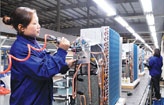
Thawing out
After a deep freeze in sales during the recession, China’s air conditioner makers are bouncing back
Preview of the coming issue
Cool Iron lady
Of good and evil
Specials
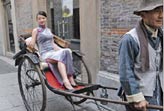
Memory lanes
Shanghai’s historic ALLEYS not just unique architecture but a way of life

Great expectations
Hong Kong-born singer songwriter rises to the top of the UK pops.
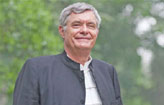
A diplomat of character
Belgian envoy draws on personal fascination to help build China ties.
